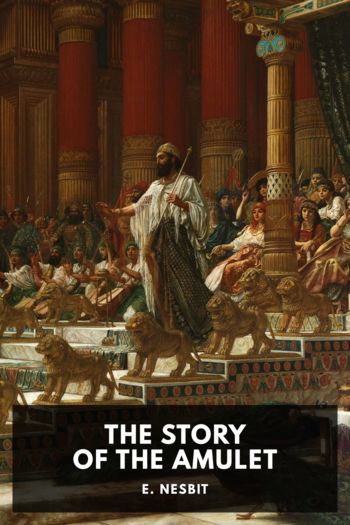The Story of the Amulet, E. Nesbit [free ebook reader for iphone txt] 📗

- Author: E. Nesbit
Book online «The Story of the Amulet, E. Nesbit [free ebook reader for iphone txt] 📗». Author E. Nesbit
I hope you notice that they were not cowardly enough to cry till their Father had gone; they knew he had quite enough to upset him without that. But when he was gone everyone felt as if it had been trying not to cry all its life, and that it must cry now, if it died for it. So they cried.
Tea—with shrimps and watercress—cheered them a little. The watercress was arranged in a hedge round a fat glass saltcellar, a tasteful device they had never seen before. But it was not a cheerful meal.
After tea Anthea went up to the room that had been Father’s, and when she saw how dreadfully he wasn’t there, and remembered how every minute was taking him further and further from her, and nearer and nearer to the guns of the Russians, she cried a little more. Then she thought of Mother, ill and alone, and perhaps at that very moment wanting a little girl to put eau-de-cologne on her head, and make her sudden cups of tea, and she cried more than ever. And then she remembered what Mother had said, the night before she went away, about Anthea being the eldest girl, and about trying to make the others happy, and things like that. So she stopped crying, and thought instead. And when she had thought as long as she could bear she washed her face and combed her hair, and went down to the others, trying her best to look as though crying were an exercise she had never even heard of.
She found the parlour in deepest gloom, hardly relieved at all by the efforts of Robert, who, to make the time pass, was pulling Jane’s hair—not hard, but just enough to tease.
“Look here,” said Anthea. “Let’s have a palaver.” This word dated from the awful day when Cyril had carelessly wished that there were Red Indians in England—and there had been. The word brought back memories of last summer holidays and everyone groaned; they thought of the white house with the beautiful tangled garden—late roses, asters, marigold, sweet mignonette, and feathery asparagus—of the wilderness which someone had once meant to make into an orchard, but which was now, as Father said, “five acres of thistles haunted by the ghosts of baby cherry-trees.” They thought of the view across the valley, where the limekilns looked like Aladdin’s palaces in the sunshine, and they thought of their own sandpit, with its fringe of yellowy grasses and pale, stringy-stalked wild flowers, and the little holes in the cliff that were the little sand-martins’ little front doors. And they thought of the free fresh air smelling of thyme and sweetbriar, and the scent of the wood-smoke from the cottages in the lane—and they looked round old Nurse’s stuffy parlour, and Jane said—
“Oh, how different it all is!”
It was. Old Nurse had been in the habit of letting lodgings, till Father gave her the children to take care of. And her rooms were furnished “for letting.” Now it is a very odd thing that no one ever seems to furnish a room “for letting” in a bit the same way as one would furnish it for living in. This room had heavy dark red stuff curtains—the colour that blood would not make a stain on—with coarse lace curtains inside. The carpet was yellow, and violet, with bits of grey and brown oilcloth in odd places. The fireplace had shavings and tinsel in it. There was a very varnished mahogany chiffonier, or sideboard, with a lock that wouldn’t act. There were hard chairs—far too many of them—with crochet antimacassars slipping off their seats, all of which sloped the wrong way. The table wore a cloth of a cruel green colour with a yellow chain-stitch pattern round it. Over the fireplace was a looking-glass that made you look much uglier than you really were, however plain you might be to begin with. Then there was a mantelboard with maroon plush and wool fringe that did not match the plush; a dreary clock like a black marble tomb—it was silent as the grave too, for it had long since forgotten how to tick. And there were painted glass vases that never had any flowers in, and a painted tambourine that no one ever played, and painted brackets with nothing on them.
“And maple-framed engravings of the Queen,
the Houses of Parliament, the Plains of Heaven,
and of a blunt-nosed woodman’s flat return.”
There were two books—last December’s Bradshaw, and an odd volume of Plumridge’s Commentary on Thessalonians. There were—but I cannot dwell longer on this painful picture. It was indeed, as Jane said, very different.
“Let’s have a palaver,” said Anthea again.
“What about?” said Cyril, yawning.
“There’s nothing to have anything about,” said Robert kicking the leg of the table miserably.
“I don’t want to play,” said Jane, and her tone was grumpy.
Anthea tried very hard not to be cross. She succeeded.
“Look here,” she said, “don’t think I want to be preachy or a beast in any way, but I want to what Father calls define the situation. Do you agree?”
“Fire ahead,” said Cyril without enthusiasm.
“Well then. We all know the reason we’re staying here is because Nurse couldn’t leave her house on account of the poor learned gentleman on the top-floor. And there was no one else Father could entrust to take care of us—and you know it’s taken a lot of money, Mother’s going to Madeira to be made well.”
Jane sniffed miserably.
“Yes, I know,” said Anthea in a hurry, “but





Comments (0)